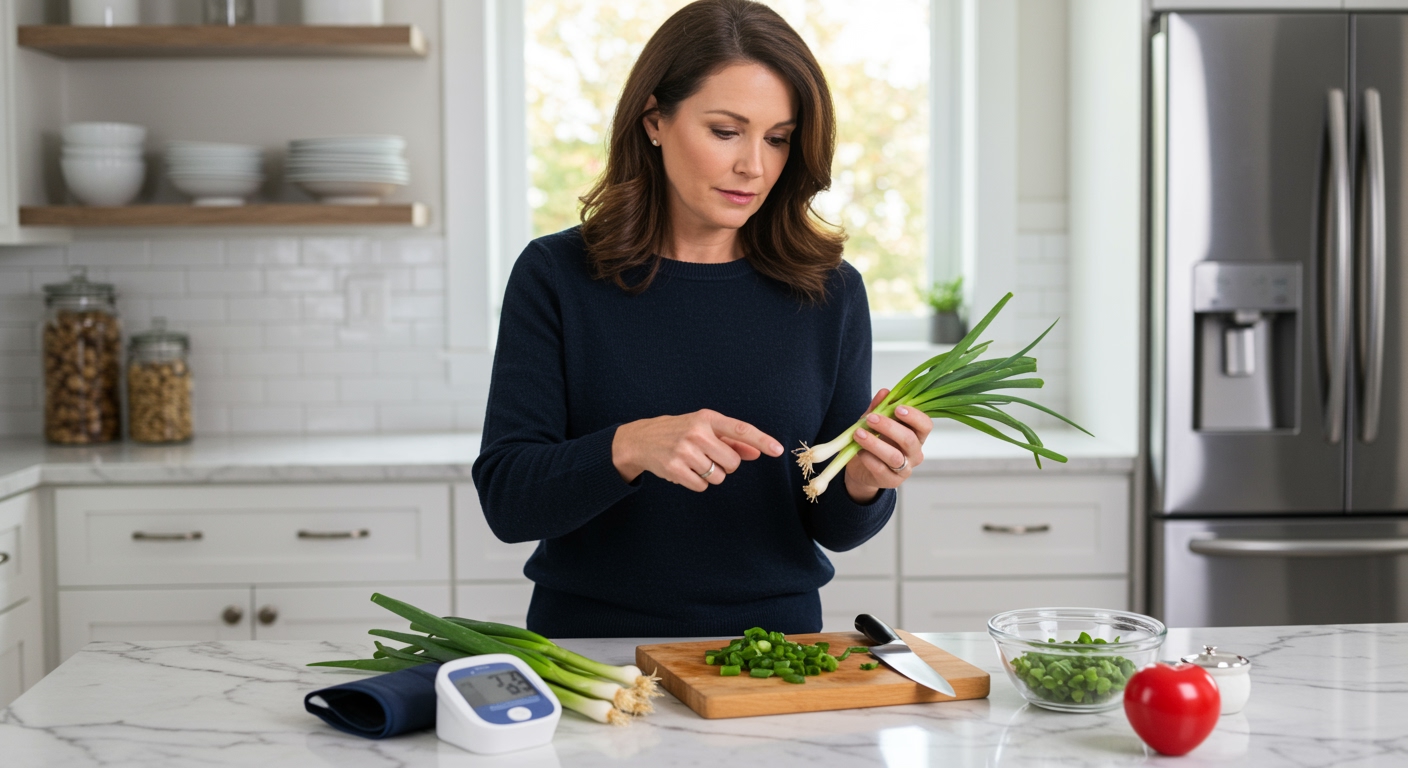✪ Key Takeaway: Scallions can lower blood pressure moderately but rarely cause dangerous drops in healthy people with normal consumption.
Introduction
You slice scallions into your stir-fry and wonder if these green onions could push your blood pressure too low.
Many people worry about this because they have heard that certain foods can cause dangerous blood pressure drops, especially if they already take blood pressure medications.
Hi, I am Abdur, your nutrition coach and today I am going to explain whether scallions can dangerously lower your blood pressure and what you need to know to stay safe.
How Do Scallions Affect Blood Pressure?
Scallions contain sulfur compounds that help relax blood vessels and improve circulation throughout your body.
These compounds work by increasing nitric oxide production in your blood vessel walls.
Nitric oxide acts like a natural signal that tells your blood vessels to widen and become more flexible.
When your blood vessels relax, your heart does not have to work as hard to pump blood through your system.
This process naturally reduces blood pressure by decreasing the resistance your heart faces with each beat.
Research shows that people who eat onion family vegetables regularly tend to have lower blood pressure readings than those who avoid these foods.
✪ Fact: Scallions contain quercetin, a flavonoid that supports healthy blood vessel function and may reduce inflammation.
Can Scallions Drop Your Pressure Dangerously Low?
The blood pressure lowering effect of scallions is mild and gradual in most healthy people.
A typical serving of scallions contains nowhere near enough active compounds to cause a dangerous blood pressure drop on its own.
Your body has built-in mechanisms that prevent sudden pressure changes from normal food consumption.
However, problems can arise if you eat large amounts of scallions while taking blood pressure medications.
The combination of medication effects plus the natural compounds in scallions could potentially cause your pressure to drop more than intended.
People with already low blood pressure should monitor their response when adding significant amounts of scallions to their diet.
Signs of dangerously low blood pressure include dizziness, fainting, blurred vision, and extreme fatigue.
✪ Pro Tip: Track your blood pressure readings for a week after increasing scallion consumption to monitor any changes.
What Amount of Scallions Is Safe?
Most people can safely eat one to two bunches of scallions per week without worrying about blood pressure effects.
This equals roughly two to four tablespoons of chopped scallions per day spread across your meals.
The key is gradual introduction rather than suddenly consuming large amounts.
Start with small amounts like one teaspoon of chopped scallions in your food and observe how your body responds.
People taking blood pressure medications should be more conservative and stick to smaller portions initially.
Your doctor can help determine the right amount based on your current medications and blood pressure targets.
Remember that cooking scallions may reduce some of their active compounds compared to eating them raw.
✪ Note: Raw scallions typically have stronger blood pressure effects than cooked ones due to higher sulfur compound content.
Who Should Be More Careful With Scallions?
People taking ACE inhibitors or other blood pressure medications need extra caution with scallion consumption.
These medications already work to lower blood pressure, so adding natural compounds that do the same thing could create an additive effect.
Individuals with hypotension or naturally low blood pressure should monitor their symptoms closely when eating scallions regularly.
Elderly people may be more sensitive to blood pressure changes from foods because their cardiovascular systems respond differently.
Anyone with heart conditions should discuss dietary changes with their healthcare provider before significantly increasing scallion intake.
Pregnant women should also be mindful since blood pressure naturally fluctuates during pregnancy.
If you experience any unusual symptoms after eating scallions, stop consumption and consult your doctor immediately.
✪ Pro Tip: Keep a food and symptom diary to identify any patterns between scallion consumption and blood pressure changes.
The Bottom Line
Scallions can lower blood pressure moderately but rarely cause dangerous drops in healthy people eating normal amounts.
Smart eating means understanding your body and respecting the power of food as medicine.
I would love to hear about your experiences with scallions and blood pressure in the comments below, and please share any questions you might have about incorporating these nutritious vegetables safely into your diet.
References
At NutritionCrown, we use quality and credible sources to ensure our content is accurate and trustworthy. Below are the sources referenced in creating this article:
- WebMD: Scallions Health Benefits
- Dr. Fuhrman: How Garlic and Onions Promote Cardiovascular Health
- PMC: Cardiovascular Effects of Onion Family Vegetables
- The Doctor’s Kitchen: Benefits of Spring Onions





